The Intel Optane Memory M10 (64GB) Review: Optane Caching Refreshed
by Billy Tallis on May 15, 2018 10:45 AM EST- Posted in
- SSDs
- Storage
- Intel
- PCIe SSD
- SSD Caching
- M.2
- NVMe
- Optane
- Optane Memory
AnandTech Storage Bench - Light
Our Light storage test has relatively more sequential accesses and lower queue depths than The Destroyer or the Heavy test, and it's by far the shortest test overall. It's based largely on applications that aren't highly dependent on storage performance, so this is a test more of application launch times and file load times. This test can be seen as the sum of all the little delays in daily usage, but with the idle times trimmed to 25ms it takes less than half an hour to run. Details of the Light test can be found here. As with the ATSB Heavy test, this test is run with the drive both freshly erased and empty, and after filling the drive with sequential writes.
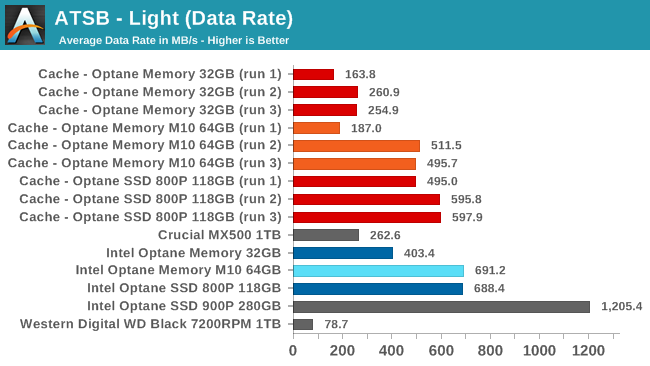
The data rates on the Light test show clear signs of a cold cache on the first run, with substantially improved performance for the second and third runs. The 32GB cache module is still a bit small for this test and it can only bring the data rates up to about the level of a SATA SSD, but the 64GB and 118GB modules allow for performance that almost matches low-end NVMe SSDs like the MyDigitalSSD SBX (and without the capacity limitations or steep performance drop when full).
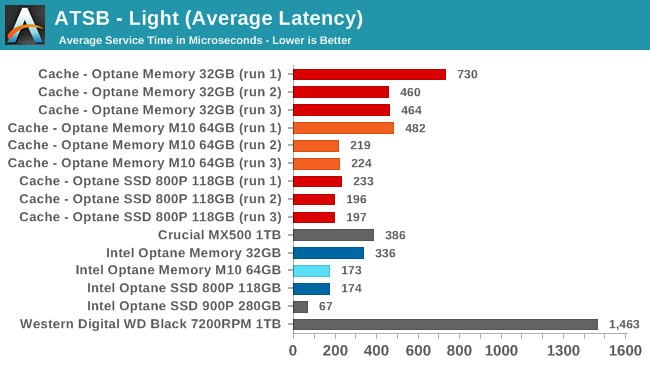
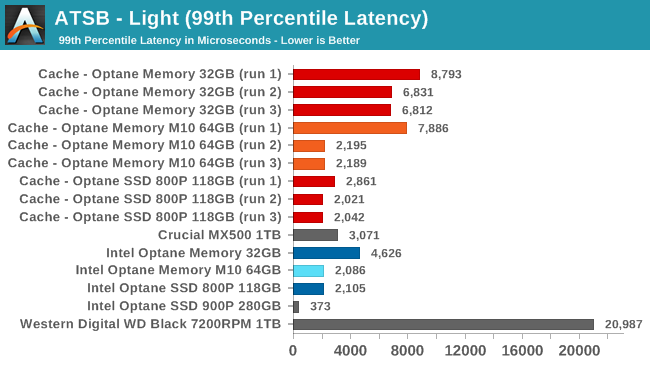
With a warmed-up cache, the Optane Memory M10 64GB and the larger Optane SSD 800P offer better average and 99th percentile latency than SATA SSDs. The 118GB cache beats the SATA drives even with a cold cache. The 32GB Optane Memory is well behind the SATA SSD even with a warm cache, especially for 99th percentile latency. But even so, all of these cache configurations easily beat running on just a hard drive.
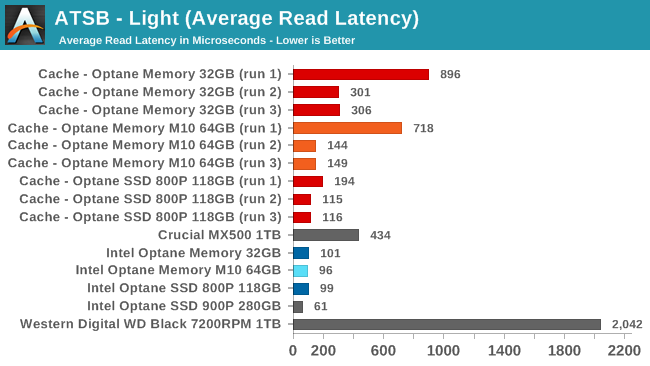
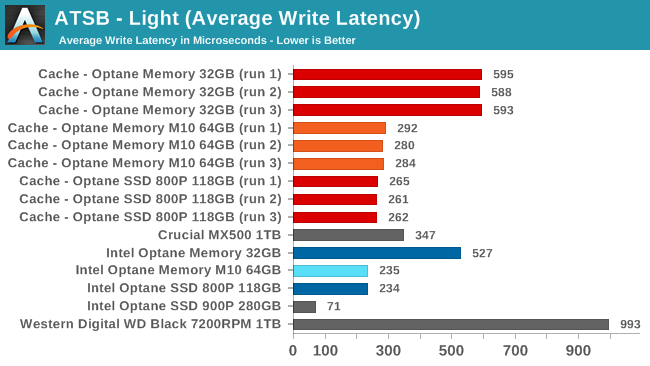
The effects of a cold vs. warm cache show up quite clearly on the average read latency chart, but naturally have minimal effect on the average write latencies. It is clear that the 32GB Optane Memory's overall latency fell behind that of the SATA SSD almost entirely because of poor write performance: with a warm cache, the read latency of the 32GB module is slower than that of its larger siblings but is still an improvement over the SATA SSD.
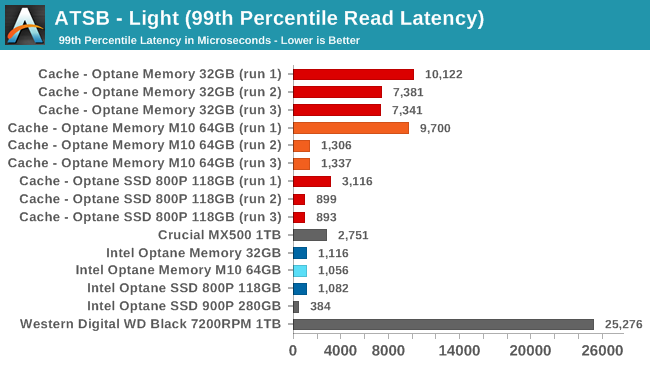
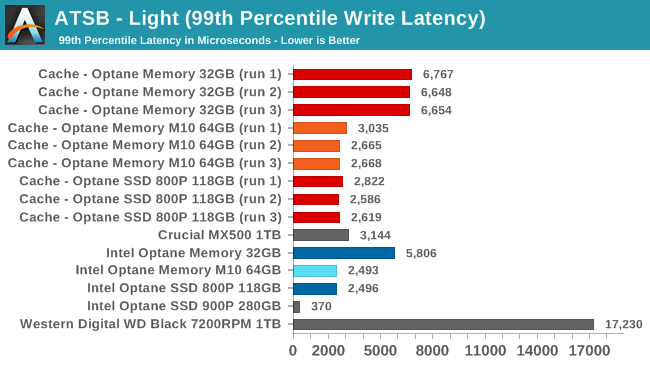
The 99th percentile read latency scores emphasize the impact of a cold cache more than the average latency, especially for the 64GB cache module. Even the 118GB cache lags behind the SATA SSD on the first run. The 99th percentile write latencies are larger in absolute terms than the average write latencies, but the relative differences are almost all the same except that the hard drive stands out even more.










96 Comments
View All Comments
FunBunny2 - Wednesday, May 16, 2018 - link
one of the distinguishing points, so to speak, of XPoint is its byte-addressable protocol. but I've found nothing about the advantages, or whether (it seems so) OS has to be (heavily?) modified to support such files. anyone know?Billy Tallis - Wednesday, May 16, 2018 - link
The byte-addressability doesn't provide any direct advantages when the memory is put behind a block-oriented storage protocol like NVMe. But it does simplify the internal management the SSD needs to do, because modifying a chunk of data doesn't require re-writing other stuff that isn't changing. NVDIMMs will provide a more direct interface to 3D XPoint, and that's where the OS and applications need to be heavily modified.zodiacfml - Friday, May 18, 2018 - link
Quite impressive but for 32GB Optane drive, I can have a 250 GB SSD.The Optane might improve performance for fractions of a second over SSDs for applications but it won't help during program/driver installations or Windows updates which needs more speed.
I'd reconsider it for a 64 GB Optane as a boot drive for the current price of the 32GB.
RagnarAntonisen - Sunday, May 20, 2018 - link
You've got to feel for Intel. They spend a tonne of cash on projects like Larrabee, Itanium and Optane and the market and tech reviewers mostly respond with a shrug.And then everyone complains they're being complacent when it comes to CPU design. Mind you they clearly were - CPU performances increased at a glacial rate until AMD released a competitive product and then there was a big jump from 4 cores to 6 in mainstream CPUs with Coffee Lake. Still if the competition was so far behind you can afford to direct to R&D dollars to other areas.
Still it all seems a bit unfair - Intel get criticised when they try something new and when they don't.
And Itanium, Larrabee and Optane all looked like good ideas on paper. It was only when they had a product that it became clear that it wasn't competitive.
Adramtech - Sunday, May 20, 2018 - link
since when is a 1st or 2nd Gen product competitive? I'm sure if they don't have a path to reach competitiveness, the project will be scrapped.Keljian - Tuesday, May 29, 2018 - link
While I don't doubt the tests are valid, I would really like to see a test with say PrimoCache - with the blocksize set to 4k. I have found in my own testing that Optane (with PrimoCache using optane as an L2 @ 4k) is very worthwhile even for my Samsung 950 pro.Keljian - Tuesday, May 29, 2018 - link
https://hardforum.com/threads/intel-900p-optane-wo... - Here are my benchmark findings for the 850 evo and 950 pro using the 32gb optane as L2 cache. You'll notice the 4k speeds stand out.denywinarto - Tuesday, May 29, 2018 - link
Thinking of using this with 12 tb hgst for a gamedisk drive for a ISCSI-based server, the data read is usually the same as they only game files. But occasionally new game gets added. Would it be a better option compared to raid? SSD are too expensive.Lolimaster - Monday, October 1, 2018 - link
Nice to use the 16GB as pagefile, chrome/firefox profile/cacheLolimaster - Tuesday, October 2, 2018 - link
It's better to use them as extra ram/pagefile or scratch disk.